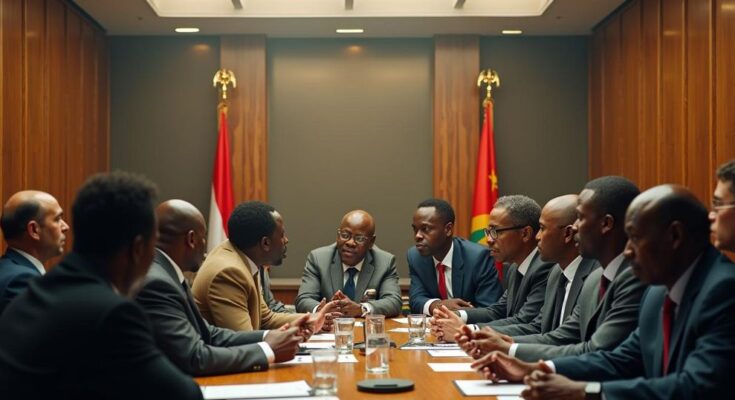South Sudan is advancing towards the establishment of a Hybrid Court to prosecute war crimes related to the ongoing civil conflict, with two pivotal legislative bills recently passed. While international donors express commitment to support the initiative, political resistance from leadership raises concerns over the implementation and potential effectiveness of transitional justice mechanisms.
South Sudan is on the verge of establishing a Hybrid Court aimed at prosecuting individuals responsible for war crimes and crimes against humanity since the onset of civil war in 2013. The move comes nearly ten years following the conflict’s eruption and aligns with the passing of two legislative bills by the Transitional National Legislative Assembly designed to lay the groundwork for the Court’s formation. The bills, namely the Commission for Truth, Reconciliation and Healing Bill 2024 and the Compensation and Reparation Authority Bill 2024, signify noteworthy progress in South Sudan’s quest for transitional justice. While significant international support from donors such as the Troika—comprising the United States, the United Kingdom, and Norway—has been promised to fund this initiative as detailed in Chapter 5 of the Revitalised Agreement on the Resolution of the Conflict in South Sudan (R-ARCSS), the ruling political elite has demonstrated reluctance towards enacting transitional justice measures, citing fears of reigniting historical grievances. The R-ARCSS represents a peace agreement signed in 2018, facilitated by the Intergovernmental Authority on Development (IGAD). However, various components, particularly those related to truth and justice, have sparked disagreements among signatories, resulting in the formation of the current Transitional Government of National Unity, described as a coalition administration. According to Bona Deng Lawrence, Chairperson of the Standing Specialised Committee on Peace and Reconciliation, the objective of the newly passed bills is to rectify the conflict’s historical impacts while providing justice and reparations to victims and establishing therapy support centers for both victims and defendants. Since hostilities erupted on December 15, 2013, stemming from a power struggle between President Salva Kiir and former Deputy Riek Machar, both sides have been implicated in serious violations of human rights and humanitarian laws. Natelina Amjima Malek, Deputy Chair of the Information Committee, emphasized the bills’ importance in offering reparations to bereaved families and restoring essential infrastructure damaged during the violent confrontations of 2013 and 2016. Despite this, skepticism looms over the potential success of the Hybrid Court, particularly given the lack of political will that has characterized the past nine years. Previous commitments to form the Hybrid Court were made under a 2015 peace accord by the government and the main armed opposition, the SPLM-In-Opposition (SPLM-IO), and were reaffirmed in the subsequent R-ARCSS. Civil rights advocate Edmund Yakani articulated concerns about the political leadership’s opposition to the Hybrid Court: “The leaders are anti-Hybrid Court. There is also the challenge of how the commission for truth, healing, and national reconciliation and the compensation and reparation process will work in the face of hostility from the political leadership.” In a public opinion piece published in June 2016 in the New York Times, President Kiir and Dr. Machar argued against the establishment of the Hybrid Court, suggesting that it would undermine national healing: “South Sudan needs truth, not trials.” Former Minister for Petroleum Ezekiel Lol Gatkuoth further stated, “There is no proven evidence in any court of law the Leadership are guilty of war crimes. The war crimes are political tools of the West to blackmail Africa.” The ongoing conflict in South Sudan has resulted in the deaths of over 400,000 individuals since 2013, with 1.5 million internally displaced and approximately 2.2 million refugees in neighboring countries, including Uganda, Kenya, Ethiopia, and the Democratic Republic of Congo. Many South Sudanese who fled to Sudan are now facing displacement internally once again due to escalating violence in the north. Political commentator Akol Miyen Kuol expressed doubts regarding the Hybrid Court’s effectiveness, contending that traditional reconciliation methods may be more beneficial in addressing war crimes: “I think it is too early for South Sudan to resort to a Hybrid Court to address the war crimes issue. Applying such a mechanism in South Sudan now could exacerbate the already delicate situation.”
The ongoing civil conflict in South Sudan, which began in December 2013, has resulted in severe human rights violations attributed to all parties involved. Attempts to address these atrocities through transitional justice have been made, including the establishment of a Hybrid Court as stipulated in various peace agreements, notably the R-ARCSS. The legislative push to form the Court reflects a critical step in the complex interplay of politics, justice, and reconciliation within a fragile governance structure, seeking to hold accountable those responsible for widespread suffering in the wake of civil unrest.
In conclusion, while the recent legislative actions in South Sudan represent a hopeful stride towards establishing a Hybrid Court and achieving transitional justice, significant challenges pervade these efforts. The historical resistance from political leaders and the deeply rooted divisions within society raise serious doubts about the Court’s potential efficacy and the overall desire to confront the legacies of conflict. As South Sudan navigates its path forward, it remains crucial to engage all stakeholders in meaningful dialogue and explore diverse approaches to justice and reconciliation.
Original Source: www.theeastafrican.co.ke




